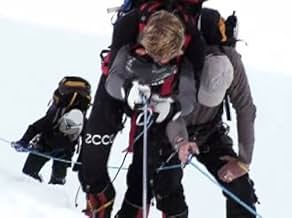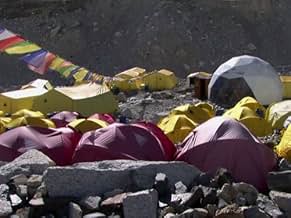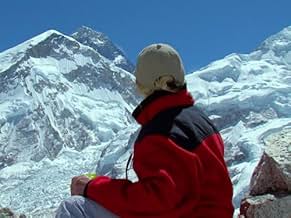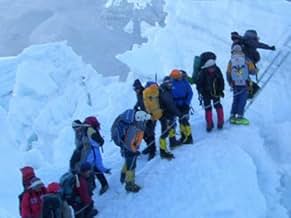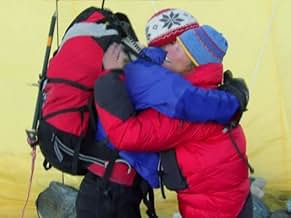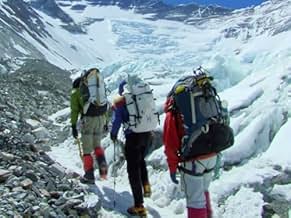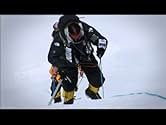Un equipo de producción sigue a equipos de escaladores, sus guías y sherpas en su intento anual de alcanzar la cumbre del Everest.Un equipo de producción sigue a equipos de escaladores, sus guías y sherpas en su intento anual de alcanzar la cumbre del Everest.Un equipo de producción sigue a equipos de escaladores, sus guías y sherpas en su intento anual de alcanzar la cumbre del Everest.
- Premios
- 1 premio ganado en total
Explorar episodios
Opiniones destacadas
As an Everest enthusiastic I've read a lot of books concerning the mountain. Lately I've been searching for good films and documentaries on the subject as well. When I checked IMDb for a series I found called 'Everest: Beyond the limit' I was thrilled. With an average grade of 8.6 and produced by the Discovery Channel this should be a blast. I was curious to see what it would be like.
The bottom-line of the show is simple. Every year, more and more commercial groups try to climb Everest. These groups consist of Westeners who have paid large sums of money to experienced Himalaya guides to get to the summit. 'Everest: Beyond the Limit' follows the commercial group lead by guide Russell Brice. The group consists of amateur climbers from all over the world, and his job is to get them to the summit. The series revolves around this struggle.
Interesting ingredients to make a stunning documentary, I'd say. Even more when considering this all happens on the steep faces of the highest mountain in the world. So, apart from the struggle to get to summit, I also expected to see impressive images, interesting background information on the mountain and an intriguing views in the lives of the Sherpa climbers who make the ascent possible.
But I can only say that after watching two seasons (I haven't seen the third yet) I am disappointed. Very disappointed. Instead of all the above, this show only focuses only on the Western climbers. The intelligence level of the show can be compared with MTV shows like 'Made' or 'My super sweet 16'. We are forced to watch the ups and downs of an asthmatic Dane and the mood swings of a Hell's Angel biker. We see a totally unprepared L.A.-journalist get pwned by the mountain. We watch them cry, suffer and struggle.
Off course, this has to be part of the show. It's the reality. But in my opinion it's a side-subject and the reason why I watch the show is Everest. I know that human interest can be very interesting, but in this show the center of attention is not the mountain or the way to the summit. The center of attention are the ups and downs of the climbers. The show revolves around it and for because of that it turned the pulp we already have too much of on TV. Really, it's 'The Real World goes Chomolungma'.
The first minutes of every episode are filled with flashbacks from the previous episode. I can understand that this is needed, to show the important things that happened before. But all the flashback focuses on is the human interest. After the flashback, we have to watch five minutes of previews of the coming episode. Off course, all focused on the human emotions. Every commercial break is preluded with a toe- wrenching cliffhanger. So dare not to swap your TV to another channel. In my personal opinion this is the exact opposite of the way the presentation should have been.
But, considering all this, I still rate the show a seven. Because when I look through all the mind-narrowing garbage the makers throw at me I see the most intriguing mountain of the world. I see a highly experienced guide trying to get through to novice stubborn clients. I see strong Sherpa's with interesting traditions (where the show obviously doesn't attends any attention to). But to see this, I have to fast forward through the all the melodrama and crap that fills up 25 minutes of every episode. But when I've done that, I see 20 minutes of high class TV.
The bottom-line of the show is simple. Every year, more and more commercial groups try to climb Everest. These groups consist of Westeners who have paid large sums of money to experienced Himalaya guides to get to the summit. 'Everest: Beyond the Limit' follows the commercial group lead by guide Russell Brice. The group consists of amateur climbers from all over the world, and his job is to get them to the summit. The series revolves around this struggle.
Interesting ingredients to make a stunning documentary, I'd say. Even more when considering this all happens on the steep faces of the highest mountain in the world. So, apart from the struggle to get to summit, I also expected to see impressive images, interesting background information on the mountain and an intriguing views in the lives of the Sherpa climbers who make the ascent possible.
But I can only say that after watching two seasons (I haven't seen the third yet) I am disappointed. Very disappointed. Instead of all the above, this show only focuses only on the Western climbers. The intelligence level of the show can be compared with MTV shows like 'Made' or 'My super sweet 16'. We are forced to watch the ups and downs of an asthmatic Dane and the mood swings of a Hell's Angel biker. We see a totally unprepared L.A.-journalist get pwned by the mountain. We watch them cry, suffer and struggle.
Off course, this has to be part of the show. It's the reality. But in my opinion it's a side-subject and the reason why I watch the show is Everest. I know that human interest can be very interesting, but in this show the center of attention is not the mountain or the way to the summit. The center of attention are the ups and downs of the climbers. The show revolves around it and for because of that it turned the pulp we already have too much of on TV. Really, it's 'The Real World goes Chomolungma'.
The first minutes of every episode are filled with flashbacks from the previous episode. I can understand that this is needed, to show the important things that happened before. But all the flashback focuses on is the human interest. After the flashback, we have to watch five minutes of previews of the coming episode. Off course, all focused on the human emotions. Every commercial break is preluded with a toe- wrenching cliffhanger. So dare not to swap your TV to another channel. In my personal opinion this is the exact opposite of the way the presentation should have been.
But, considering all this, I still rate the show a seven. Because when I look through all the mind-narrowing garbage the makers throw at me I see the most intriguing mountain of the world. I see a highly experienced guide trying to get through to novice stubborn clients. I see strong Sherpa's with interesting traditions (where the show obviously doesn't attends any attention to). But to see this, I have to fast forward through the all the melodrama and crap that fills up 25 minutes of every episode. But when I've done that, I see 20 minutes of high class TV.
I'm old, I'm isolating and running out of things that amuse me on the television. I came across this while looking through on demand shows. I am really enjoying it. I would never have climbed Everest even when I was young, but I have always been interested in stories about the people who do climb it. This is the best documentary I have seen with the combination of reality TV and kind of the inside story of how things work with these type of expeditions. I know it has its faults, but it's been something to loo forward to, to me. I am on series 2 and will watch series 3.
10photo-43
Rare is the in-depth series on a great adventure such as climbing Mt. Everest. This mini-series is one such, and for armchair alpinists, it is time well spent to follow this crew up the longest hill on the planet.
The human element is very much in play throughout -- the New Zealand climber trying to summit Everest after losing his legs in another climbing tragedy before, the Hollywood Harley designer climbing against all odds after being pieced together with screws and wires following a horrific motorcycle accident, the French man attempting the climb a mere two weeks after having a cancerous kidney removed. By any of our normal standards, these people living normals lives is a heroic feat. But these are not normal lives: they are on a quest to summit the world's tallest mountain and perhaps one of its most dangerous forbidden zones. A tall order for you or I, but for them, an even taller one -- and a challenge they cannot resist.
They are led by one of the world's great climbers, who nurses, kicks, leads and cajoles them to go forward, or in some cases, turn around while they still are relatively certain to get back down alive. Having lost 80% of his mates to climbing accidents, Russell Brice knows tragedy. As he says to one climber over the radio in one episode "I don't want to have to call your wife and tell her you've died on Everest." You can tell Russell Brice means what he's saying. And that the news he brings, good or bad, is indeed the way things are.
Some make the top and get back down, and others do not, turning around at different points on the climb. All gave it their all, in a place where that statement is literal, not figurative.
In short, if you want to get a great idea of what climbers see on their way up Everest, and also see glimpses of the suffering required to complete such and extreme challenge, then this show is for you.
The human element is very much in play throughout -- the New Zealand climber trying to summit Everest after losing his legs in another climbing tragedy before, the Hollywood Harley designer climbing against all odds after being pieced together with screws and wires following a horrific motorcycle accident, the French man attempting the climb a mere two weeks after having a cancerous kidney removed. By any of our normal standards, these people living normals lives is a heroic feat. But these are not normal lives: they are on a quest to summit the world's tallest mountain and perhaps one of its most dangerous forbidden zones. A tall order for you or I, but for them, an even taller one -- and a challenge they cannot resist.
They are led by one of the world's great climbers, who nurses, kicks, leads and cajoles them to go forward, or in some cases, turn around while they still are relatively certain to get back down alive. Having lost 80% of his mates to climbing accidents, Russell Brice knows tragedy. As he says to one climber over the radio in one episode "I don't want to have to call your wife and tell her you've died on Everest." You can tell Russell Brice means what he's saying. And that the news he brings, good or bad, is indeed the way things are.
Some make the top and get back down, and others do not, turning around at different points on the climb. All gave it their all, in a place where that statement is literal, not figurative.
In short, if you want to get a great idea of what climbers see on their way up Everest, and also see glimpses of the suffering required to complete such and extreme challenge, then this show is for you.
EXCELLENT...I am always amazed that the CAMERMEN are THERE TOO!!! Although mentioned, they are obviously making the CLIMB TOO, with the greater difficulty of HEAVY EQUIPMENT and often times keeping their "eyes" on the climbers, with less regard for their own safety. They are treated no differently, are kept out of view, risk their lives for the entertainment of the viewer...maybe many of them are experienced climbers, but still, they must have a great love of the "sport"...I feel a special on "behind the scenes" of "Everest: Beyond the Limit" and other documentary specials should be produced to show their dedication, commitment and daring to their profession.
I once enjoyed watching movie named "Vertical Limit" - a true hint of mountaineer's consciousness and spirit. Only this time the highest Mountain will put mens' guts to the test you can find nowhere else.
The cameramen-sherpas have done outstanding job so the viewer is literally on the mountain with the expedition members witnessing their pain and struggle, defeat and victory. Plus the panorama views are almost to die for. This is the rarest scenery I have seen in my life so far! Both seasons are strongly recommended!
However, may be, people who have never been to the mountains themselves will not be able to appreciate in full this excitement, almost awe of the mens' spirit. :(
Overall, for me it's like the final breakthrough of Tim Robbins in "Shawshank Redemtion" only this time there are real people not just movie characters.
The cameramen-sherpas have done outstanding job so the viewer is literally on the mountain with the expedition members witnessing their pain and struggle, defeat and victory. Plus the panorama views are almost to die for. This is the rarest scenery I have seen in my life so far! Both seasons are strongly recommended!
However, may be, people who have never been to the mountains themselves will not be able to appreciate in full this excitement, almost awe of the mens' spirit. :(
Overall, for me it's like the final breakthrough of Tim Robbins in "Shawshank Redemtion" only this time there are real people not just movie characters.
Selecciones populares
Inicia sesión para calificar y agrega a la lista de videos para obtener recomendaciones personalizadas
- How many seasons does Everest: Beyond the Limit have?Con tecnología de Alexa
Detalles
- Fecha de lanzamiento
- País de origen
- Sitio oficial
- Idioma
- También se conoce como
- Эверест: За гранью возможного
- Productora
- Ver más créditos de la compañía en IMDbPro
- Color
Contribuir a esta página
Sugiere una edición o agrega el contenido que falta

